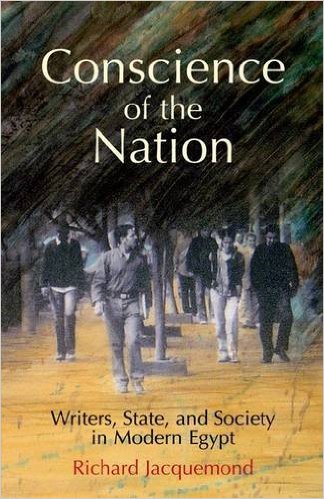Conscience of the Nation: Writers, State, and Society in Modern Egypt
By Richard Jacquemond, translated by David Tresilian
The American University in Cairo Press, 2008
The specter of the great Egyptian writer Naguib Mahfouz haunts Richard Jacquemond’s “Conscience of the Nation: Writers, State, and Society in Modern Egypt.” In Jacquemond’s conception, Mahfouz is the greatest example of the drama of the modern Egyptian writer who expresses “the gulf that never seems to get any narrower between his prophetic ambitions and the extreme difficulty he has in disseminating his work, whatever the form that the censorship might take.”
Jacquemond’s book addresses the major opposing factions in the intellectual field – religious and secular – and how they struggle over the spiritual direction of Egyptian society. To become the “conscience of the nation,” a writer must practice what Jacquemond calls “the legitimate field of literature” – a fusion of creativity and commitment, of aesthetic innovation and political and social engagement. This fusion is most prominently seen in the Arab novel, “an important form of expression for the collective imaginary.”
Jacquemond’s scope of study covers the major events in Egyptian literary history from the 1960’s to the present day (the book has been updated with a postscript since its original publication in French several years ago). In addition, he covers many genres including poetry, novels, short stories, journalism and the theater. Jacquemond states that his aim is to describe and analyze the major aspects of the Egyptian literary idea of the writer as the conscience of the nation and of literature as a mirror of society. By taking his readers on a historical journey from the pre-colonial moment through the present day, the author concludes that the Egyptian literary field is immune from the phenomena of the “death of the great writer” that has been experienced in the literary spaces of Europe and North America.
Jacquemond, an associate professor of modern Arabic language and literature of Provence, France, presupposes the reader’s knowledge of modern Egyptian history. Those without familiarity with this period might find it difficult to navigate the changes in state political control from pre-colonial Egypt to the present day. Jacquemond also addresses the marginalization and separation of women’s writing in Egypt stating that “critics unceasingly complain of the stereotypical representation of ‘female literature’ in critical writings by men, and continue to reject the labeling of their work in this way.” One wishes that, instead of further isolating women’s writing by placing it under its own sub-category in his own book, Jacquemond would have incorporated their works into the same discussions with which he analyzes male writers.
To his credit, Jacquemond does spend time discussing regional writers, Nubian literature, and the Cairene literary scene. This gives the reader a perspective on why certain writers such as Mahfouz, Toufic al-Hakim, and Yussef Idris achieved their legendary status while others were relegated to relative obscurity. He also includes several helpful appendices which consist of a comprehensive list of Egyptian writers and critics, and state literature and prizes from 1958-2006.
Jacquemond clearly states that it is less a matter of what can or cannot be written or published, than who has the authority to write and publish in Egypt. The structures of censorship are manifold, ranging from state censorship to “street censorship” to what he calls “Islamization from below.” Despite these pressures, he demonstrates that there has been a quantitative explosion in literary production and a feminization and internationalization of the literary field. Given all of these contradictory and conflicting elements, Jacquemond leaves readers with the ambivalent impression that the future of Egyptian literature is one that “will have many happy years ahead of it, both for better and for worse.”
This article appeared in Al Jadid Magazine, Vol. 15, No. 60, 2009.
Copyright © 2009 AL JADID MAGAZINE

